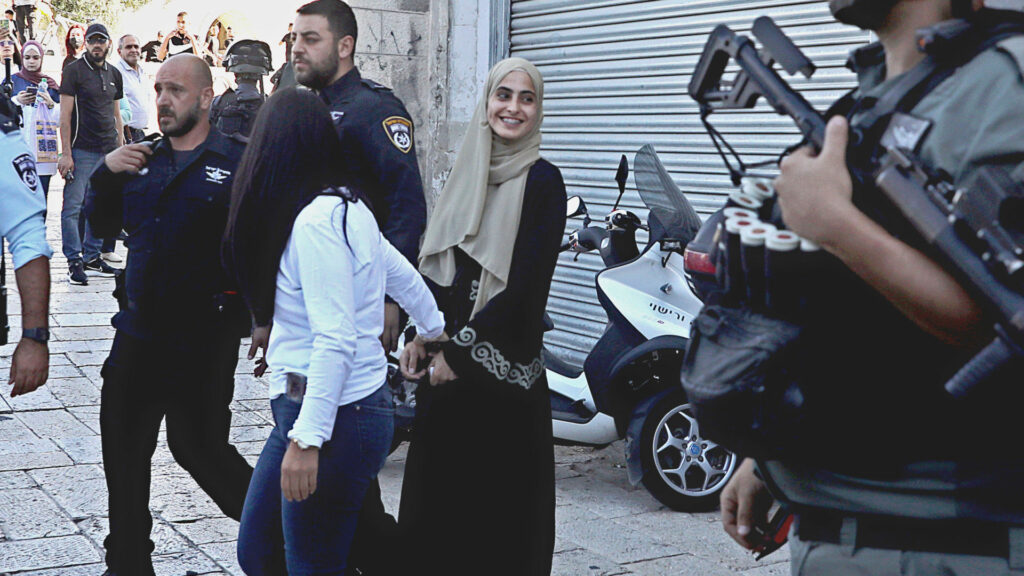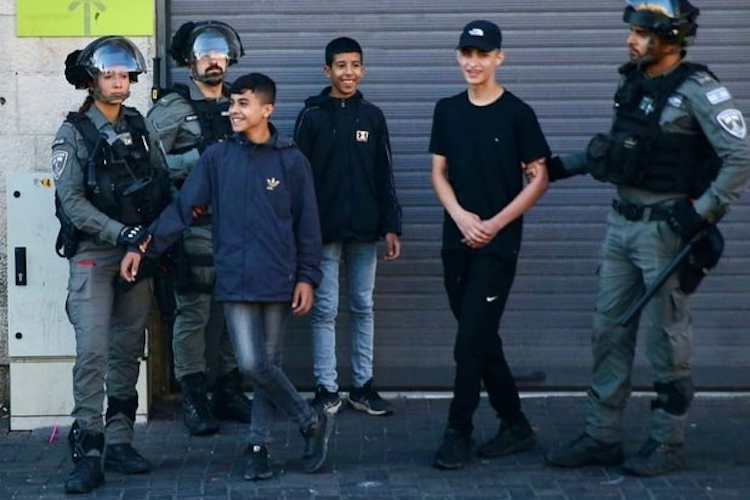Smiling as an Act of Resistance in Occupied Palestine
PALESTINE ISRAEL GAZA GENOCIDE, 30 Aug 2021
Mahmoud Soliman | Roar Magazine - TRANSCEND Media Service
Under the threat of detention and eviction, Palestinian smiles are a powerful message of resistance and hope: “Our smiles beat their brutality.”
11 Aug 2021 – Palestinians living in occupied Palestine have been facing ethnic cleansing and forcible displacement from their villages for more than seven decades. This has been pursued through house demolitions, restriction of movement, curfews, arbitrary arrests and detentions, land confiscations and the denial of access to water, electricity, health and education. Yet Palestinians have also resisted displacement with the aim of rebuilding destroyed houses, ending the Israeli occupation and finally having their freedom.
In April 2021, a new wave of uprisings began against the eviction of 28 Palestinian families (around 500 residents) from the Sheikh Jarrah neighborhood in East Jerusalem. With this new uprising, scenes of Palestinian youth being beaten and humiliated before being handcuffed by Israeli soldiers have gone viral on social media. One can only imagine the miserable situation these detainees must be in after such dehumanizing treatment. Yet, to the surprise of the Israeli soldiers and the world, detained youth responded to the obscenity with beautiful smiles, disrupting Israel’s apparatus of intimidation.
One of these photos captured arrest of Meryam Afifi, a young Palestinian woman who lives in Sheikh Jarrah. Her family is one of the 28 threatened by the evictions. During an interview with Afifi a few days after she was released, she said:
They detained me while I was trying to protect my friend…the soldier provoked me when he told me, “Now that you are arrested, I want to see what you can do.” As if he is telling me that “I defeated you and you cannot do anything. You are helpless.” At that moment, I smiled. At that moment, I felt victory. It was clear that he was defeated when he got angry. Then, smiling became a trend among youth and the army started to cover detainees faces to prevent [photographers from] capturing their smiles.
Some audiences, especially those who are pro-Israel, perceive detainees’ smiles as an expression of carelessness to their situation. This is mistaken. Looking through a narrow lens at the Palestinians’ situation, this audience does not understand the context nor daily life of Jerusalemites under the Israeli occupation. Yet Palestinians themselves reveal through speeches, conversations and testimonies posted on social media that smiling conveys various messages at the moment of detention and is a powerful act of resistance.
httpv://www.youtube.com/watch?v=SCIasDCtm7A
History of Sheikh Jarrah
The 28 Palestinian families of Sheikh Jarrah are refugees who were expelled from their homes in 1948. They have been living in Sheikh Jarrah since 1956. At that time, an agreement was made between the Jordanian Ministry of Construction and Development and the United Nations Relief and Works Agency (UNRWA) so that the Jordanian government would provide the land while the UNRWA would cover the costs of housing construction. But Jordanian rule of the West Bank lasted only until 1967, when Israel captured it. In 1972, two Israeli settlers’ organizations claimed ownership of the land and at this point the families’ battle inside of Israel’s discriminatory courts to prevent expulsion from their homes began.
In 2008, Israeli authorities evicted the first Palestinian family from Sheikh Jarrah. Since then, residents have organized different forms of nonviolent resistance, including sit-ins and collective actions. Meanwhile, Israeli occupation authorities began to escalate the process of land annexation and settlement building throughout occupied Palestine. In April 2021, in the village of Beita to the south of Nablus city, Israel built a settlement consisting of more than 20 house units for 50 settler families in only a week’s time. With the support of many activists, the residents of Beita organized a round-the-clock resistance campaign to return their land. During the same period, Israel escalated house demolitions and theft in the Silwan neighborhood of East Jerusalem, against which the residents have also raised a campaign of resistance.
Israel’s actions have only enhanced the mobilization of Palestinians in Jerusalem and elsewhere in Historic Palestine. Palestinians interpret the eviction of the families as another act of ethnic cleansing which perpetuates their Nakba (catastrophe) and the protests, which included tens of thousands of Palestinians, spread to the old city of Jerusalem, West Bank and throughout Israel itself.
Israeli occupation forces have brutally suppressed these nonviolent protests. To repress the protesters and deprive Palestinians of the spirit of resistance, detention campaigns are among their most effective tools. During the month of Ramadan, Israeli occupation forces arrested more than 400 participants in order to stop them from organizing protests and sit-ins in the Old City of Jerusalem’s squares, such as the plaza of Damascus Gate.

Muna El Kurd, activist and Sheikh Jarrah resident smiles as she is arrested in front of her home by Israeli occupation forces. Photo by Mahmoud Elian.
Youth under occupation
Today’s Palestinian youth were all born under the Israeli occupation. They are the ones who have first-hand experience of living with systematic oppression and discrimination on daily basis. They are the ones who have built their own houses, and who, if they want to move, are ordered by the Israeli authorities to demolish them or otherwise be forced to pay the Israeli government when Israel forcibly demolishes them. These youths are the ones who grew up under house arrest; when they were kids, even of ages less than 12, they were not allowed to go to school and would face arrest if they did. The life of Jerusalemites is hard for outsiders to imagine.
The spirit of Jerusalem’s Palestinian youth can be summed up through the words of one middle aged Palestinian when he stood between an Israeli soldier and a youth, addressing the former: “Listen you do not know the youth of Jerusalem, maybe you are coming from another city to serve here. The youth here do not care if you arrest them. They will laugh if you arrest him. I advise you to leave the city and not to provoke the youth.”
To encourage local, national and international mobilization and elevate media coverage of their struggle, Palestinian youth are using a range of creative tactics. Smiling is one creative tactic that transfers power from the oppressor to the oppressed in ways the oppressor cannot simply ignore. Smiling enhances the effectiveness of any refusal to cooperate with Israeli occupation authorities and supports positive actions that help to build alternatives. As one detained youth explained to me: ‘‘The army want us to be sad and to feel guilty. When we smile this means that we challenge the army, and this is resistance.”
It shows great courage to smile during arrest. The aim of detention is to scare participants, punish them for their involvement in the demonstrations or sit-ins and prevent them from taking part in any future protests. In the past, people told detainees “Don’t worry, be strong.” But in this last uprising, detainees are reminded by those around them to smile. For those under arrest who are preoccupied with the pain in their bodies and the fear of torture, when they are encourage encouraged by others to smile, it is like being told “Do not be afraid.” Therefore, the smile has become a new norm for detainees; those who forget are reminded so that fearlessness and courage become collective.
Smiling fits within the resistance culture of the residents in Sheikh Jarrah, where daily life under the settlers’ occupation and repression is unbearable. As Mariam Afifi explained to journalists: “I smiled while I was under arrest to show to the army that I am not afraid and I am not defeated, despite the oppression used against me. When we smile the army become imprisoned and we turn the power balance.”
As a resident of the West Bank, I myself have been detained many times but have never been able to smile. Smiling during detention requires a courage and inner strength as big as the youth of Jerusalem. It is a crucial message that activists are unafraid, and that detention will not intimidate them.
Changing the image of detained Palestinians
At the moment of detention, smiling conveys various messages — one specifically directed at the media. Activists are seeking to break the routine where detained Palestinians are portrayed with dejected faces and downcast eyes. Local Palestinian media often shows the brutality of the Israeli occupation and the illegality of its policies, yet this perpetuates the image of Palestinians as victims. Meanwhile, the Israeli media ignores Palestinian nonviolent resistance and represents Palestinians as violent in order to prevent the kind of Israeli solidarity that occurred during the First Intifada. International mainstream media generally ignores Israeli oppression of Palestinians and represents Palestinians as violent, poor and angry people.
Smiling has challenged these representations in local, Israeli and international media, shaping a new image of Palestinian youth and creating a shift in international and Israeli opinion. Two Palestinian youths from Sheikh Jarrah, the twins Mohammed and Muna El Kurd, have been interviewed many times by western mainstream media such as CNN and BBC.
Concern about the phenomenon of smiling is growing among Israeli occupation forces. Many arrested activists have been investigated for smiling while being arrested. Israel’s concern is about maintaining its image in the world as a powerful country with one of the strongest armies in the Middle East.
Smiling also convey a message among the families of Sheikh Jarrah that the detainees are well. Israeli colonial policies have long sought to dismantle Jerusalemites’ collective identity and indigeneity by fragmenting and isolating the people through checkpoints, restrictions and placing new settlers in Sheikh Jarrah who attack the local Palestinian families. Every Palestinian must have a mobile phone to stay in touch with their families because to leave their homes is to risk not coming back. Parents are always worried about their children, even if they are only going to school.
When Israeli forces detain a youth, they isolate the detainee and refuse to let them to speak to their families to enhance the family’s fear about what will happen to them. When I was 18 years old and arrested for the first time, my father slept three nights in front of the jail, waiting to see any released prisoner to ask them if they had seen me or heard about me. The first moments of arrest are the most difficult for the family, because the detainees’ lives are uncertain. As one youth explains: “[Smiling] was a message to my family that I am okay and strong. When I was detained and I saw all the activists looking at me, I thought the best way to communicate with them and to tell them that I am okay is through smiling, because I knew that the soldiers will beat me if I speak.”
The residents of Sheikh Jarrah have known each other for decades. They have strong social ties and each night they gather in the backyards having food together. Smiling shows they are in solidarity with each other to protect themselves from the settlers.
Loving life and the struggle for liberation
Smiling is usually an expression of happiness, a way for people to convey their joy in the moment. But during hard times, smiling is also a powerful way to convey contradictory messages. Palestinian detainees from Jerusalem have turned smiling into an act of resistance. In such situations, detainees are expected to be crying, full of confusion, frustration and fear. Yet, the detainees are able to stand proud even in the hardest of moments.
Sometimes a smile alone can gain a victory. Palestinian activists’ smiles smash the image of the occupation and shake its agents from within. This explains why the Israeli occupation army try to cover their faces so that their smiles will not encourage others or be captured by camera. As an activist during summed up during a meeting:
My smile was a response and mockery of my arrest…When we are plagued with pain, we as humans are supposed to cry and that’s a sign of defeat to the Israeli soldiers. But what we do is the opposite. You aim to break us, but I am mocking your system. It even renders the system useless, ineffective, and the soldiers dragging a handcuffed arrested person smiling look so stupid.
The Israeli government has maintained their military supremacy by equipping their army with modern weapons, including weapons of mass destruction, but their military supremacy is unable to counter the smile of resistance and hope. As another activist told me: “Our smile beats their brutality.”
Many groups who lack knowledge about this historical context and Palestinian culture think that Palestinians should be angry — as if happiness is not designed for Palestinians and what suits oppressed people is anger and sadness. I experienced that when internationals visited my village and participated in our demonstrations against the separation wall. Some of them started to cry when they confronted the Israeli soldiers’ violence; others immediately got angry and started screaming at the soldiers. They were inspired by the way Palestinians love life and steal a smile in the middle of such hard moments.
This passion for life and hope for the future is reflected in Palestinian literature, such as in the poetry of Mahmoud Darwish:
We love life whenever we can.
We steal a thread from a silk-worm to weave a sky and a fence for our journey.
When the youth of Sheihk Jarrah smile, they reflect the vision of a happy future for a Palestinian generation who loves life and struggles for their liberation. Their smiles represent the failure of the occupation.
___________________________________________

Mahmoud Soliman is a Palestinian nonviolent activist, human rights defender and academic. He is one of the founders of the Palestinian resistance network Popular Struggle Coordination
This essay was produced in collaboration with the Resistance Studies Initiative.
Tags: Checkpoints, Conflict, Fatah, Gaza, Geopolitics, Hamas, Human Rights, International Criminal Court ICC, Israeli Apartheid, Israeli Army, Israeli occupation, Nakba, Oslo Accords, Palestine Israel Apartheid Wall, Palestine/Israel, Palestinian Rights, Politics, Power, Settlers, Social justice, State Terrorism, UN, USA, Violence, West Bank, Zionism
Join the BDS-BOYCOTT, DIVESTMENT, SANCTIONS campaign to protest the Israeli barbaric siege of Gaza, illegal occupation of the Palestine nation’s territory, the apartheid wall, its inhuman and degrading treatment of the Palestinian people, and the more than 7,000 Palestinian men, women, elderly and children arbitrarily locked up in Israeli prisons.
DON’T BUY PRODUCTS WHOSE BARCODE STARTS WITH 729, which indicates that it is produced in Israel. DO YOUR PART! MAKE A DIFFERENCE!
7 2 9: BOYCOTT FOR JUSTICE!
DISCLAIMER: The statements, views and opinions expressed in pieces republished here are solely those of the authors and do not necessarily represent those of TMS. In accordance with title 17 U.S.C. section 107, this material is distributed without profit to those who have expressed a prior interest in receiving the included information for research and educational purposes. TMS has no affiliation whatsoever with the originator of this article nor is TMS endorsed or sponsored by the originator. “GO TO ORIGINAL” links are provided as a convenience to our readers and allow for verification of authenticity. However, as originating pages are often updated by their originating host sites, the versions posted may not match the versions our readers view when clicking the “GO TO ORIGINAL” links. This site contains copyrighted material the use of which has not always been specifically authorized by the copyright owner. We are making such material available in our efforts to advance understanding of environmental, political, human rights, economic, democracy, scientific, and social justice issues, etc. We believe this constitutes a ‘fair use’ of any such copyrighted material as provided for in section 107 of the US Copyright Law. In accordance with Title 17 U.S.C. Section 107, the material on this site is distributed without profit to those who have expressed a prior interest in receiving the included information for research and educational purposes. For more information go to: http://www.law.cornell.edu/uscode/17/107.shtml. If you wish to use copyrighted material from this site for purposes of your own that go beyond ‘fair use’, you must obtain permission from the copyright owner.
Read more
Click here to go to the current weekly digest or pick another article:
PALESTINE ISRAEL GAZA GENOCIDE:
